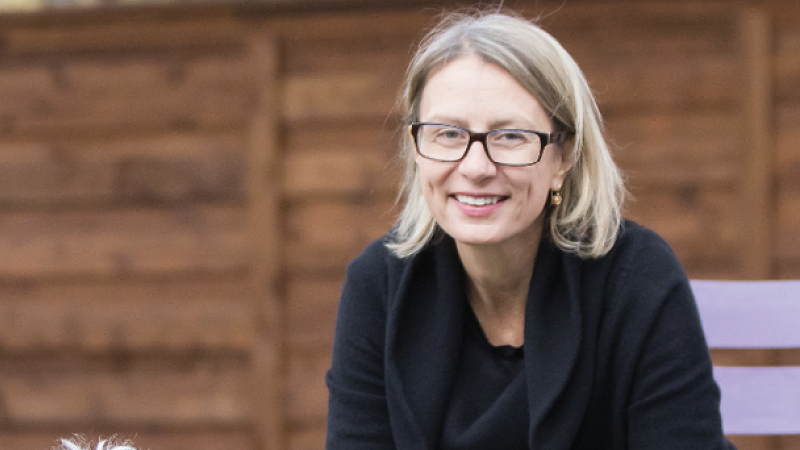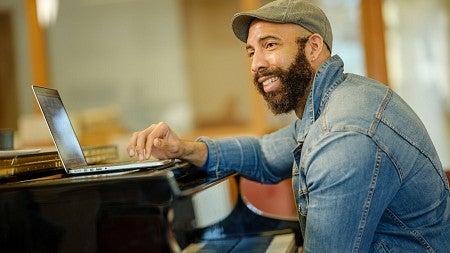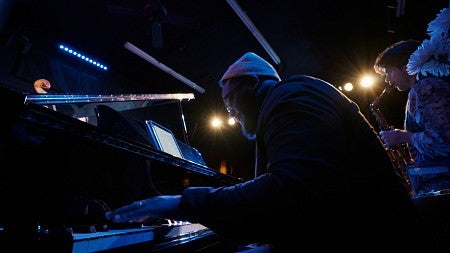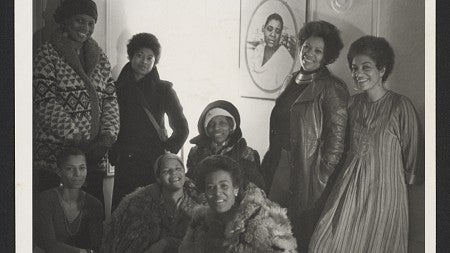
Adrian Parr: An Explorer by Design
The design dean will help the UO flex its imagination in the pursuit of environmental and social justice
By Alex Notman Cipolle • Photo by Shirley Che Studios • April 7, 2021
5 min readAs a kid in Sydney—growing up at the confluence of the Blue Mountains, the Australian bush, and the Pacific Ocean—Adrian Parr liked to get lost.
“I used to play this game where I’d like to see how lost I could get until that moment where you get a little freaked out and think, ‘I’ve gone too far off the path,’” says Parr, her accent mellowed after nearly two decades in the United States.
The new dean of the College of Design has been described as a philosopher, poet, cultural critic, environmental activist, author (she’s written eight books), and filmmaker (her 2016 documentary, The Intimate Realities of Water, won more than a dozen awards, including Best Documentary at the 2016 United International Independent Film Festival).
But after a lifetime of getting lost on purpose to better know the world, perhaps “explorer” is the title most suited to Parr, given her curiosities and breadth of experience. The latter includes an interdisciplinary scholarly acumen that connects the dots between architecture and cultural criticism, aesthetics, political theory, and environmental studies.
An activist at heart, Parr sees her work—and the college’s longstanding commitment to sustainability—dovetailing nicely with the university’s new environment initiative, a focus on bringing design and other areas of expertise to bear toward environmental and social justice.
“The college is incredibly well-poised to contribute in a meaningful way,” Parr says. “This is something that people in the college have been doing for a long time.”
Parr says the college and university must flex what she calls “our emancipatory imagination” for environmental and social justice, an argument she makes in her book, Birth of a New Earth (2017).
“We have to be able to imagine a world that’s different than the world we live in at the moment,” Parr says. “And imagine a different kind of relationship to—not just to one another but to people we’ve never met, and to future generations.”
Patrick Phillips, provost and senior vice president, says, “The College of Design is somewhat unique nationally in the scope of its educational programs and the breadth of its scholarly and creative work. Adrian’s work and background, which span art, analysis, criticism, and policy work, match this breadth nearly perfectly. We are very fortunate to have her joining us as dean.”
Since 2013, Parr has served as chair on water and human settlements for the United Nations Educational, Scientific, and Cultural Organization.
This appointment has sent her on site visits around the globe, from rural Tanzania to the Rohingya areas of Bangladesh, to north of the Arctic Circle. One visit, to the slums of Nairobi, particularly shaped Parr’s philosophy and trajectory. She spent time with four women who lived in shacks, trying to understand how water and sanitation affected their everyday lives.
“I would accompany them collecting water, washing clothes, taking care of their children,” Parr says. “It may sound corny, but there is such a strength of character, in the face of adversity, in all the women I spent time with. As a theorist and philosopher, it does underscore the fact that there are so many other ways of knowing the world. Not everything can always be summarized by reason and logic.”
What she learned from these women Parr included in the documentary, The Intimate Realities of Water. She wanted the women to represent themselves in their own terms and calls the film a collective undertaking. Parr sends funds raised through screenings of the documentary back to the women.
“As a white woman coming in and benefiting from this, I wanted to create a structure where they were also beneficiaries of the research,” Parr says.
Parr’s commitment to resilience and justice will buttress the college’s own priorities, be that the School of Architecture & Environment’s Design for Spatial Justice Initiative or the School of Planning, Public Policy and Management’s newly launched Sustainable Communities and Public Good academic residential community (ARC). Created by University Housing, the ARCs are programs that help students find a community based around shared interests and passions for inquiry.
Parr has also had a lifelong engagement in the cultivation of arts. She is related to two world-renowned contemporary artists: her father is performance artist and printmaker Mike Parr and her aunt, who lived next door to the Parr home in Sydney, is multimedia artist Julie Rrap.
When Parr, an only child, wasn’t wandering the forest or bodysurfing, she tagged along with her family on art adventures, traveling in a station wagon to exhibitions throughout Europe.
“Those are my formative childhood years,” Parr says. “It was very free.”
Parr comes to the UO from the University of Texas at Arlington, where she was dean of the College of Architecture, Planning, and Public Affairs. She holds a PhD in cultural studies and philosophy from Monash University in Melbourne and a master of arts from the Department of Politics and Philosophy at Deakin University in Geelong.
Joining Parr in Eugene is husband and Associate Professor Michael Zaretsky (MArch ’98)—the new head of the Department of Architecture—and their middle school-age son, Yehuda, and high school-age daughter, Shoshanna. (Their oldest son, Lucien, lives in Cincinnati but is considering a move to Eugene.) And, of course, their beloved Portuguese Water Dog, Savannah, has become a Eugene resident as well.
“I’m sure everyone at the UO will get to meet Savannah at some point, because I often bring her with me to things,” says Parr, laughing.
Alex Notman Cipolle, MA ’11 (journalism), is a staff writer for the College of Design.




